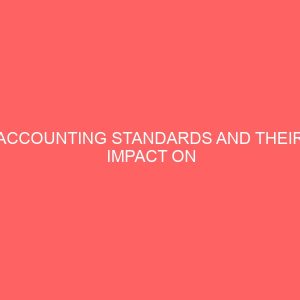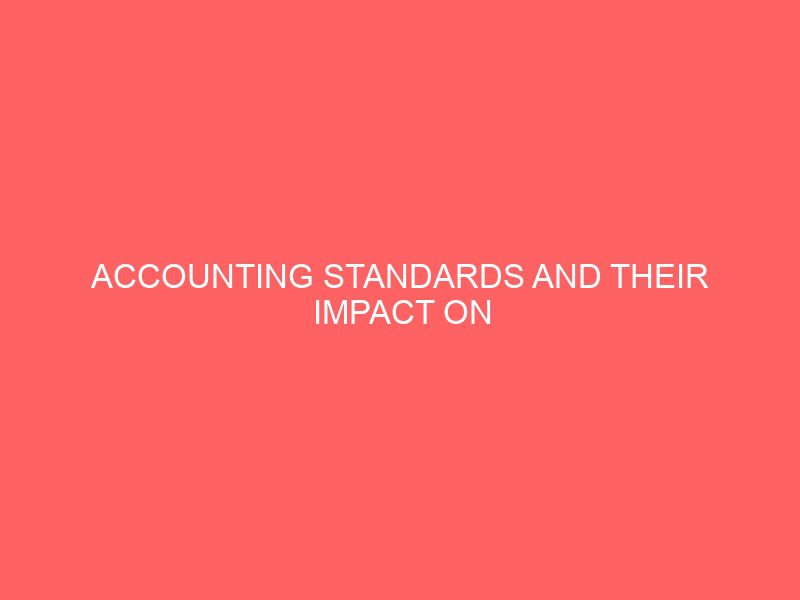Description
ACCOUNTING STANDARDS AND THEIR IMPACT ON ACCOUNTING PRACTICE IN NIGERIA
CHAPTE ONE
1.0 INTRODUCTION
1.1 Background of the Study
Accounting standard can be regarded as the type of accounting prepared which: follow a laid down rife. It usually demands minimum level of disclosure and lay down principles which enable the accountant to specify the account prepared clearly and male a nice report based on the account prepared.
Again, accounting standard in line; with the financial statement which is usually prepared annually and enable the company to know their profit and loss account. The essence of adopting such standard is to enable the accountant to know the principles of account very well and known that the account is crediting and debiting.
Accounting standard could be regarded as the balance sheet, profit and loss account value added taxes financial statement are prepared to summarize the end result of all the business activities of an enterprises during the social economic political and technological environment.
Accounting standard being the routes which regulated the manner which business’ of registered companies must be reported to the public. And again incorporate financial statement are to be adopted by the management In the . preparation of the financial statement such as balance sheet, income statement etc which the accountant/ auditor can stand and make a report which based on the financial statement of the company. It is the fundamental to the understanding and interpretation of financial statement. The accounting standard assets the user of accounting information to understand by prompting improvement in the quality of the information disclosure in financial accounting standard.
1.2 Statement of the Problems
This study in tends to look at the accounting standard and their impact on accounting practices in Nigeria. The accounting standards in Nigeria are expected to exposed to risk/problems which affects its effective performance unable to ascertain their financial position of the company.
1.3 Objective of the Study
1. To determine whether poor management affects the user of financial statements such as accountants investors bankers.
2. To handout whether investor analyze the financial statement before making investment decision.
3. To know the need of preparing the financial statement of the company.
4. To make a recommendation based on the finding.
1.4 Research Question
1. Do the poor management affects the compares performance in terms of maintaining the accounting standard?
2. Do investors carryout the analysis of the financial statement before making investment decision?
3. Is there any need for the preparation of the financial statement?
1.5 Hypothesis
Hypothesis IS a kind of questing thoughts formulated by. the researcher in line with research question. It is classified as follows.
Positive and negative hypothesis positive hypothesis means yes (Alternative) white negative hypothesis means no (null).
Hypothesis 1
Ho: Poor management does not affect the companies performance in terms of accounting standard.
Poor management affects the companies performance in terms of accounting standard.
Hypothesis 2
Ho: Financial statement do not show the financial position of the company.
HI: Financial statement show the financial position of the company.
Hypothesis 3
Ho: There is no impact of account of practice on account standard.
HI: There is impact of account of practice on account standard.
1.6 Significance of the Study
This study centre on the important or benefit the researcher derived from this research work. And again, it is known that the financial statement is very essential because it will help the company to know the detailed about their company in terms of financial statement.
Accounting is the process of analyze interpretation and communicating of financial statement to the users of accounting standard. Thus, the financial standards of the company which enable the organization to know to guide the management on how to make use of resource in producing goods and services. It also helps company to analyzed and interpret their financial statement properly.
This study is intended to provide a guide to the interested to provide guide to the interested parties such as investor’s management creditors.
Finally, this study enable the accounting users to maintain the accounting standard in order to know their actual result.
1. 7 Scope and Limitation of the Study
The research has covered a financial institution united bank of Africa (UBA) which has its branches of Okpara Avenue, Agbani Road and Kenyetta with specific emphasis of the accounting standard and its impact on the practice in Nigeria and the limitations of the study is that the time given to the researcher to carry out this study was not enough.
Secondly, the method used in collecting data for this research was expensive, the cost of internet materials which was the’ major source of collecting data for this research has gone so high that the researcher had not gotten limited materials for the research.
1.8 Definition of Terms
Accounting- Is the process of indentifying recoding communication, summarizing and interpretation of financial statement which undergoes a serous of lack down to an economic effect.
Accounting Information- this refers as a data that are found in financial statement of the firm.
Accounting standard- These are rutes which governed the manner of accounting in which specific business transaction of registered company must be reported to the public.
Financial statement- Is a statement of accounting which consists of balance sheet profit and loss accounts and income statement.
NASB – Nigeria Accounting Standard Boards which known as financial reporting council of Nigeria is the site board established on 9th September 1992 which is responsible for the issuance of accounting standard.
Book keeping- Is the act of recording business transaction In terms of money between an individual.
Cash book-Is a special journal and also book of original entries where all cash receipt and payment are records to other book of accounting.
Balance sheet- Is a statement that shows the assets and liabilities of the trader.
Capital budget- Is the entire process of planning the expenditure whose return are expected to extend beyond a short duration.
NPV- Net present value is one of the discount factor that is simplicity recognizes the time value of money.
ARP- accounting Rate of return is the ratio of an average annual profit after tax and the total amount of average investment of a project. It is known as return on investment.
PBP- Payback period is the length of time required to recoup/recover the initial cash out flow of a project.








Reviews
There are no reviews yet.